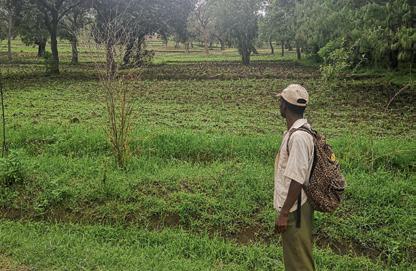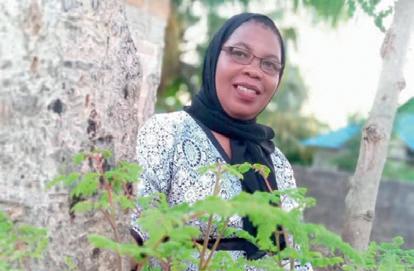
6 minute read
TANZANIANS AND THEIR GARDENS
Gardening is growing in Tanzania
Tanzania is blessed with fertile land so saving up to buy a farm is a popular investment here. However, you don’t need a farm to start growing your own fruits and vegetables, a small patch of garden is enough. As well as helping put fresh food on your table, gardening has been proved to be good for your health, both physical and mental. Here Tanzanian home gardeners reveal the joy of watching things grow and we reveal some tips on how to get started with your own garden.
Sadick Sausi - Mbeya
Any visitor to the Untengule Coffee Lodge – a charming restaurant with rooms set amid plantations producing worldfamous gourmet beans on the slopes of the Mbeya ranges – will be well aware of the greenfingered prowess of Sadick Sausi. As Utengule’s head gardener, he leads a team in maintaining the hotel’s fruit and flame tree-filled grounds, which provide a lush foreground to spectacular views across the East African Rift Valley.
Sausi is a walking advert for the health benefits of gardening. In his 50s, but looking a good couple of decades younger, he is also the hotel’s go-to guide for hikes to the top of Mount Mbeya – good luck keeping up with him – and walks the 14km round trip commute from his village Ihombe each day.

The region gets plenty of sunshine and rain so agriculture dominates the economy. Like many of his neighbours, Sausi has his own growing garden in Ihombe. “I use it to plant food crops, mostly,” he says. “I grow potatoes, onions, tomatoes and fruit like avocadoes.
“I love spending time in my garden. I enjoy the work and being outside in nature and the garden provides my family with food and an extra source of income as I take the surplus produce to market to sell.”
Edina Chongola - Stone Town

Emerson Spice, a lovingly restored former merchant’s house in the heart of Zanzibar Island’s Stone Town, is home to two of the island’s most unforgettable dining experiences. The Tea House Restaurant offers views across the ramshackle rooftops and minarets of Stone Town – beyond beautiful at sunset – and the ground level Secret Garden is a lushly landscaped hidden ruin to dine in under the stars while being entertained by some of the best in Zanzibari live music. In both establishments the menu represents a taste safari through Swahili cuisine with dishes drawing on the archipelago’s plentiful seafood and spices. Emerson Spice head chef Edina Chongola sources her ingredients locally, including from her own garden. Born in Iringa, Chongola has been living in Zanzibar for the past 20 years and in that time has cultivated her own garden, growing a range of edible plants. Much of the produce feeds her own family, but she does use anti-oxidant-filled moringa leaves picked from her own garden along with avocado and baobab oil to make to make an avocado tartare, which is a delicious accompaniment to dishes at Emerson Spice. She also grows her own spinach for another hotel favourite, mchicha – a Tanzanian spinach and peanut curry.
“Whenever I have time off from work,” she says, “I love to spend time in my garden. It is very relaxing.” To book a table at the Emerson Spice restaurants, visit emersonspice.com
Bibi Zaituni - Dar es Salaam
Proof that you don’t need the fertile soils of the Zanzibar archipelago or the southern highlands to grow your own produce is Bibi Zaituni’s urban garden in Dar es Salaam. Her little spot is an oasis among the dusty streets and tightly packed settlements of Dar neighbourhood Mwananyamala. Zaituni is a much-valued part of the community here. A trained midwife, she has lost count of the babies she has delivered over the years – she knows it’s into three figures – and has continued the healthcare with her garden. The small patch of land at the front of her home is full of medicinal plants and has served as a natural pharmacy for the community over the years. Among the wealth of plants are cloves for toothache, ginger for relieving nausea, eucalyptus for wound healing and aloe vera for burns and to calm digestion. Zaituni’s public service even extends to collecting plastic waste from the surrounding streets to make rugs and mats she sells to the public. If you would like to buy some of her products, Zaituni’s garden is a regular stop on the Dar city tours offered by bike adventure company Afriroots. Visit afriroots.co.tz

Just looking at gardens is good for your health
The International Association of Horticultural Producers says there is scientific evidence to prove that gardens are essential to supporting recovery from illness and just the act of looking at gardens can reduce stress, blood pressure and muscle tension.
So if you are in Dar and don’t have a garden of your own, it may be worth visiting the city’s Botanical Gardens. Situated just behind the National Museum and House of Culture, the garden is a welcome shady spot in the city and is home to the Dar es Salaam Horticultural Society, which tends the indigenous and exotic plants, including scarlet flame trees, several species of palm, cycads and jacaranda.
How to start your own home garden
1. Find a good location
When looking for a location to grow your produce you need to consider the following: Is the soil soft enough for the crop roots to grow through and water to seep into? Does the soil contain nutrients that assist with plant growth? If not, you can add nutrients by using natural fertilisers such as animal manure or food leftovers.
You need to make sure that your garden is not too close to any trees, which will have a root system that may interfere with the growth of your crop. Is there direct access to sunlight? Crops need at least six hours of contact with sunlight every day to flourish.
Is there enough room to grow all the crops you want without planting them too close together? Crowded plants don’t grow well and it encourages pests and diseases.
2. Pick the right seeds for your garden
Most places in Tanzania are relatively warm throughout the year, so you should first do some research on what seeds grow best in your area. After you get an idea of what you can plant, you need to decide what you want to grow and eat. There’s no point growing a vegetable you don’t like the taste of!
In warm cities like Dar es Salaam, Dodoma, and Morogoro, ideal crops include bush beans (maharage); cucumbers (matango); aubergine (mbilinganya); okra (bamia); peppers (pilipili hoho); cabbage (kabichi) and tomato (nyanya). Make sure to purchase quality seeds of the crop to ensure that they germinate. Ideally, they should be from the year’s crop.
3. Get some tools
An ideal starter kit would include a shovel (koleo); a watering can (keni); shears (mikasi); a rake (reki); a garden knife (mkasi wa bustani); a spade (chepeo); gloves (glavu); pruning shears (kata majani) and a hoe (jembe). Start small. A garden plot of about five metres by three metres can feed a family of four and have some crops left over for friends. It’s best to start with a small garden that you can manage and be proud of.



